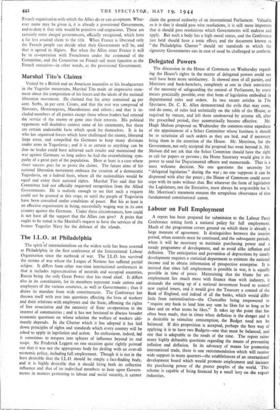The I.L.O. at Philadelphia
The spirit Of internationalism on the widest scale has been asserted at Philadelphia in the first conference of the International Labour Organisation since the outbreak of war. The I.L.O. has survived the storms of war where the League of Nations has suffered partial eclipse. It differs from other war-time international conferences in that it includes representatives of neutrals and occupied countries, Russia being the only Great Power that has stood aloof. It differs also in its constitution, for its members represent trade unions and employers of the various countries, as well as Governments ; thus it draws its mandate from wide constituencies. The Conference has thrown itself with zest into questions affecting the lives of Workers and their relations with employers and the State, affirming the rights of free association and the necessity of State co-operation in the interest of communities ; and it has not hesitated to discuss broader economic questions on whose solution the welfare of workers ulti- mately depends. In the Charter which it has adopted it has laid down principles of rights and standards which every country will be asked to apply in legislation and action. Its enthusiasm, indeed, led it sometimes to trespass into spheres of influence beyond its real scope. Sir Frederick Leggett on one occasion quite rightly pointed out that it was not the appropriate body for dealing with an over-all economic policy, including full employment. Though it is not in the least desirable that the I.L.O. should be simply a fact-finding body, and it is highly desirable that it should bring both its collective influence and that of its individual members to bear upon Govern- ments in matters pertaining to labour and social security, it cannot
claim the general authority of an international Parliament. Valuable as it is that it should pass wise resolutions, it is still more important that it should pass resolutions which Governments will endorse and apply. But such a body has a high moral status, and the Conference just held should have a tonic effect; and the document known as " the Philadelphia Charter " should set standards to which the signatory Governments can in case of need be challenged to conform.


























 Previous page
Previous page